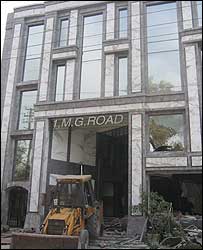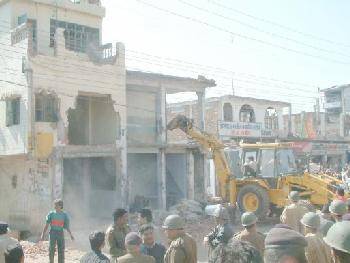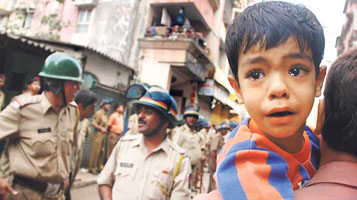
STOP THIS DEMOLITION MADNESS
Author - VT Joshi

|
STOP THIS DEMOLITION MADNESS
|
The whole nation is helplessly watching the outrageous "demolition drama" for the past several weeks in parts of Delhi and Bombay, as it did in Bhopal, Indore and scores of other places elsewhere not long ago. Most people look askance at the bizarre spectacle of destruction. Some gleefully while others in dismay and contrition, and yet others in great agony and trauma. It is a pathetic sight of solid structures crumbling one after another under the hammer of the demolition squads or razed to the ground by rumbling bulldozers. It is a strange spectacle, an urban malaise, ostensibly to avoid urban chaos. It is a cruel irony that the Manmohan Singh government has belatedly woken up to the harsh realities after so much destruction and havoc have been heaped upon the victims, and has decided to set up a committee to "look" into the situation.
The entire issue of the malady of unauthorized constructions urgently demands a refreshing new approach, a critical re-assessment and a civilized method of handling it. Whatever their origin, illegal or otherwise, encroached or usurped, is it not a wanton destruction of national properties into the making of which precious national resources have been used? Even misused, one must concede? But there are surely better, more sensible methods of punishing the guilty. It would only be proper to dispossess the defaulters, impose heavy penaltes, and confiscate the properties and put them to better use -- instead of indulging in massive destruction and thoughtless vandalism. Is it not totally inexcusable and unwarranted, particularly when there is an acute shortage of constructed space for housing and manifold other related requirements everywhere? Even the hallowed judiciary must sit up and take a pragmatic view of the problem contrary to the wisdom, or the appalling lack of it, it has shown so far in ordering massive demolitions. A strange argument against confiscation and heavy penalty is: "You can't buy illegality" when hardly anything legal happens in the messy affair.

Not many will shed copious tears for the business losses of the so-called designers on the MG road in Delhi or elsewhere in the country as most discerning observers perceive their outfits as "centres of evil", spreading the fashion parade culture of nudity. But even their detractors, not to speak of most people across the country, are pained at the devastation of so many exquisite buildings and beautiful structures, and are equally horrified by the demolition of the more modest dwellings of the poor.

DANCE OF DESTRUCTION
It is heartless for Mr. Jaipal Reddy, the union minister for urban development, has watched the traumatic events for months and now turns round and says he will consider "alternative solutions" while his newly appointed deputy, Ajay Maken, confessed in a TV programme that virtually nothing is right with the archaic, obsolete by-laws. There is once again loose talk of promulgating an ordinance to "regularize the illegal" structures, but all this after targeting some 18000 houses to feed the bulldozers in Delhi alone and several thousand more in Mumbai, which have shot into instant "fame". Unlike a large number of smaller places and colonies which have been routinely passing through the same destructive trauma but, being located in the so-called 'back waters' of the country, have escaped notice on the national radar of public attention.

In Bhopal, for instance, an entire row of eight brand new beautiful double-storey bungalows was blasted and left in a heap of rubble in a matter of hours. Contrast this with another instance of a huge three-storey building running an elaborate "papad" factory (repeat papad factory) with giant power driven grinders in the basement in a prestigious residential colony in the M. P. capital, for the past few years without let or hindrance. Repeated appeals and complaints to the civic authorities as also to the State Human Rights Commission by the aggrieved Residents' Association have been in vain. In Indore a huge multi-storey residential cum commercial complex was razed to the ground under the glare of TV cameras and in full public view some five years after it was constructed. The ballistic experts specially drafted to do the job and the civic authorities, who had ordered it, complimented one another in wreaths of smiles after the deed.
The official justification is that they were all illegal constructions, which had no business to be there in the first place. Very true and fine. It is an 'excellent' justification sanctioned by the judiciary in its infinite wisdom. A bewildering variety of reasons are cited: encroachment of government land, violation of master plans (which, in any case, keep changing under political or commercial pressure), projected new public needs, public nuisance, obsolete by-laws, traffic snarls, chaotic urbanization and so on.
The point has been laboured ad infinitum, indeed ad nauseum: Who is responsible for all this? Who permitted the unauthorized structures to come up in the first place? Obviously the rich builders who make their pile through illegal gratification and rampant bribery of the minions of the civic bodies empowered to make and break a plethora building laws and by-laws. These officials and executives are seldom known to be punished beyond initial bald announcement of their suspension. Invariably they are known to weave their way back into favoured positions after a very short time. The builders who have a strong lobby of supporters among politicians, perhaps next only to the mafia dons, have already made their fortune, even before starting the construction, by extracting a heavy price from unwary, prospective owners aspiring to acquire small, obscure flats in huge building complexes by pawning and pledging their life time savings.
REAL SUFFERERS
Thus when a huge complex or even a small house or slums comes under the hammer of the demolition squad, it falls on the poor flat owners or small time trader-owners, who are deprived of their modest dwellings and put to untold suffering and hardships. This pathetic human aspect, rather the inhuman aspect, seems to be hardly realized, let alone remedied, while the crowd of idle spectators and jay walkers watches and cheers what the media, ever hungry for senseless "Breaking News" mania, describes as the "great Indian demolition drama".
Recent TV debates failed to bring out all the aspects of this tragic drama, the participants representing sectional interests and sticking to their guns. The bureaucrats asserting that illegal constructions must be demolished immediately or even 30 years later; the lawyers arguing that it is a matter of illegality whatever else might be the implications or repercussions; the builders exonerating themselves from the original sin on the specious plea that they are serving the nation by the sheer act of building; town planners talking of the violation of the master plans which often undergo subtle and at times not-so-subtle changes far too often; architects delighting in the beauty of their modern designs and comely creations; the judicial representatives sticking to the enforcement of laws and by-laws as brought before them by the contending parties in stuffy, grubby court rooms; but none taking an over all view of the magnitude and misery of the demolition madness and the tragedy it brings in its train.

The nearest who came to the whole truth in one of the TV shows was the eminent lawyer, Ram Jethmalani. But he also failed to hit the nail on the head since he got involved in defending himself against the accusation of protecting the moneybags like builders and mafia dons through long convoluted, pedantic legal arguments in the courts.
VT Joshi
8 February 2006

VT JOSHI (1925-2008) worked for more than fifty years as a journalist. He retired from THE TIMES OF INDIA in 1989. During 1985-89 he was the Special Correspondent of THE TIMES OF INDIA in Pakistan. His books "PAKISTAN: ZIA TO BENAZIR" and "INDIA AT CROSS ROADS" (co-author GG Puri) were widely reviewed in both India and Pakistan.

© All Rights Free